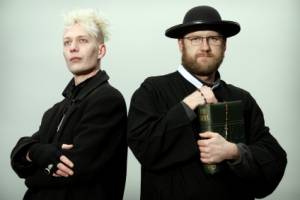Should the ULC Ministry Support Atheist Churches?
 The Universal Life Church embraces all faiths (and non-faiths), including atheism, but is it possible, or even desirable, to start a church for atheists, or is this a contradiction in terms to be avoided? Britain already has its own atheist church, which meets at a former church building in London. Although many religious and non-religious individuals alike see a conflict in the idea, the ULC sees it as a creative way to build a sense of community.
The Universal Life Church embraces all faiths (and non-faiths), including atheism, but is it possible, or even desirable, to start a church for atheists, or is this a contradiction in terms to be avoided? Britain already has its own atheist church, which meets at a former church building in London. Although many religious and non-religious individuals alike see a conflict in the idea, the ULC sees it as a creative way to build a sense of community.
Sunday Assembly is a first for Great Britain, which has a significantly higher atheist population than the very religious United States. According to data from a 2011 census, one if four people in England and Wales identify as non-religious, whereas 5 percent of Americans identified as atheist. However, the number of atheists is growing around the world, including Canada as well as Britain. In order to serve this growing segment of the population and create a space where secularists could commune, stand-up comedians Sanderson Jones and Pippa Evans co-founded the church, called The Sunday Assembly, and decided there was no better place to locate it than in a church-turned-entertainment venue in Islington called The Nave. But could atheists who get ordained online in the Universal Life Church do the same thing?
Jones and Evans seem to have made the concept work. Two hundred “worshipers” attended the first service, held on 6 January, where the congregation discussed the theme of “Beginnings” and achieving success be letting go of past failures and avoiding mental “booby traps”. With such a generic focus, who is to say more won’t show up at following services? To cement their status as a non-religious gathering, rather than hold a sermon by a traditionally ordained minister, the church invited a children’s author, Andy Stanton, to discuss the topic, and rather than lead a prayer church leaders encouraged the congregation to close their eyes and meditate on feelings of inadequacy and fear of failure, while Jones took the stage as MC. And, just as traditional churches sing hymns, the Sunday Assembly congregation sang a rendition of the Oasis song “Don’t Look Back In Anger”.
Despite Jones and Evans’s concept, not everybody is pleased with the idea of an atheist church. One of the more vocal critics in the religious community is the Revd Saviour Grech of Saint Peter and Saint Paul Roman Catholic Church in Clerkenwell: “How can you be an atheist and worship in a church? Surely it’s a contradiction of terms. Who will they be singing to?” the Islington Gazette reports him as saying. Meanwhile, secularists have argued that Jones and Evans risk of turning atheism into a religion, according to The Huffington Post UK. But Jones has countered that he and Evans are not trying to create a religion, but build a “useful community”, and that receiving complaints from both atheists and the religious means they are doing the right thing. For ministers ordained online, Jones has a good point: there need be no contradiction in the idea of an atheist “assembly”.
Like The Sunday Assembly, the Universal Life Church is an unconventional church which doesn’t fulfill everybody’s expectations of what a church should be, given its practice of online ordination. However, that does not necessarily mean the concept is contradictory or unworkable. As a ULC minister, what do you think about Jones and Evans’s atheist church? Do you think it is a contradiction, or do you think it is a way of building a viable community for the non-religious?

